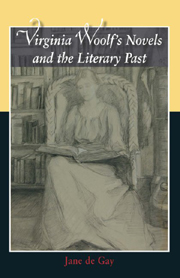Book contents
- Frontmatter
- Contents
- Acknowledgements
- Abbreviations
- Introduction
- 1 From Woman Reader to Woman Writer: The Voyage Out
- 2 Tradition and Exploration in Night and Day
- 3 Literature and Survival: Jacob's Room and Mrs Dalloway
- 4 To the Lighthouse and the Ghost of Leslie Stephen
- 5 Rewriting Literary History in Orlando
- 6 ‘Lives Together’: Literary and Spiritual Autobiographies in The Waves
- 7 Bringing the Literary Past to Life in Between the Acts
- Conclusion
- Select Bibliography
- Index
3 - Literature and Survival: Jacob's Room and Mrs Dalloway
Published online by Cambridge University Press: 12 September 2012
- Frontmatter
- Contents
- Acknowledgements
- Abbreviations
- Introduction
- 1 From Woman Reader to Woman Writer: The Voyage Out
- 2 Tradition and Exploration in Night and Day
- 3 Literature and Survival: Jacob's Room and Mrs Dalloway
- 4 To the Lighthouse and the Ghost of Leslie Stephen
- 5 Rewriting Literary History in Orlando
- 6 ‘Lives Together’: Literary and Spiritual Autobiographies in The Waves
- 7 Bringing the Literary Past to Life in Between the Acts
- Conclusion
- Select Bibliography
- Index
Summary
It is widely accepted that Jacob's Room (1922) and Mrs Dalloway (1925) are Woolf's first experimental novels, building on radical short stories such as ‘Kew Gardens’ and ‘The Mark on the Wall’ and on the theories of fiction developed in ‘Modern Novels’. Woolf abandons the rigid chapter structure she criticised in ‘Modern Novels’, adopting in both a more flexible form built on sketches or ‘moments’ of varying length. She eschews a documentary approach to character in Jacob's Room by making the eponymous character an enigma, and in Mrs Dalloway by concentrating on the mental experience of her protagonists, the latter being especially radical for embracing the psychotic consciousness of Septimus Warren Smith. Woolf also wrote both novels with an awareness of the work of her contemporaries, particularly T. S. Eliot, whom she had met in 1919, and James Joyce, whose Ulysses she had read in draft form in 1918 and grudgingly admired.
However, as this chapter will demonstrate, alongside her innovations Woolf maintained a respect for the literary past and remained concerned about tradition and canonicity. The tension is evident within ‘Modern Novels’ itself, for Woolf notes that her ‘quarrel … is not with the classics’ (E, III. 31), levelling her criticism against the popular writers of the time: the previous half-generation of novelists represented by H. G. Wells, Arnold Bennett and John Galsworthy; and although she hails Joyce as the leading figure in a new trend, she none the less compares him unfavourably with Thomas Hardy, Joseph Conrad, Laurence Sterne and William Thackeray (E, III. 33–4).
- Type
- Chapter
- Information
- Virginia Woolf's Novels and the Literary Past , pp. 67 - 95Publisher: Edinburgh University PressPrint publication year: 2006



